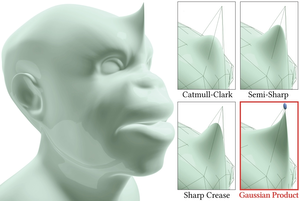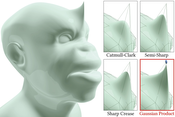Information
- Publication Type: Journal Paper with Conference Talk
- Workgroup(s)/Project(s):
- Date: July 2019
- Journal: ACM Transactions on Graphics
- Volume: 38
- Open Access: yes
- Number: 4
- Location: Los Angeles, USA
- Lecturer: Reinhold Preiner
- ISSN: 0730-0301
- Event: ACM SIGGRAPH 2019
- DOI: 10.1145/3306346.3323026
- Conference date: 28. July 2019 – 1. August 2019
- Pages: 35:1 – 35:11
- Keywords: Gaussian mixtures, surface reconstruction, subdivision surfaces
Abstract
Probabilistic distribution models like Gaussian mixtures have shown great potential for improving both the quality and speed of several geometric operators. This is largely due to their ability to model large fuzzy data using only a reduced set of atomic distributions, allowing for large compression rates at minimal information loss. We introduce a new surface model that utilizes these qualities of Gaussian mixtures for the definition and control of a parametric smooth surface. Our approach is based on an enriched mesh data structure, which describes the probability distribution of spatial surface locations around each vertex via a Gaussian covariance matrix. By incorporating this additional covariance information, we show how to define a smooth surface via a nonlinear probabilistic subdivision operator based on products of Gaussians, which is able to capture rich details at fixed control mesh resolution. This entails new applications in surface reconstruction, modeling, and geometric compression.Additional Files and Images
Weblinks
BibTeX
@article{Preiner_2019,
title = "Gaussian-Product Subdivision Surfaces",
author = "Reinhold Preiner and Tamy Boubekeur and Michael Wimmer",
year = "2019",
abstract = "Probabilistic distribution models like Gaussian mixtures
have shown great potential for improving both the quality
and speed of several geometric operators. This is largely
due to their ability to model large fuzzy data using only a
reduced set of atomic distributions, allowing for large
compression rates at minimal information loss. We introduce
a new surface model that utilizes these qualities of
Gaussian mixtures for the definition and control of a
parametric smooth surface. Our approach is based on an
enriched mesh data structure, which describes the
probability distribution of spatial surface locations around
each vertex via a Gaussian covariance matrix. By
incorporating this additional covariance information, we
show how to define a smooth surface via a nonlinear
probabilistic subdivision operator based on products of
Gaussians, which is able to capture rich details at fixed
control mesh resolution. This entails new applications in
surface reconstruction, modeling, and geometric compression.",
month = jul,
journal = "ACM Transactions on Graphics",
volume = "38",
number = "4",
issn = "0730-0301",
doi = "10.1145/3306346.3323026",
pages = "35:1--35:11",
keywords = "Gaussian mixtures, surface reconstruction, subdivision
surfaces",
URL = "https://www.cg.tuwien.ac.at/research/publications/2019/Preiner_2019/",
}


 image
image Paper
Paper
